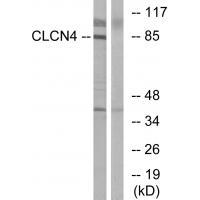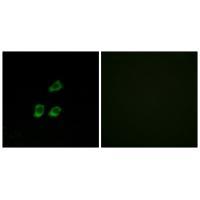

| WB | 咨询技术 | Human,Mouse,Rat |
| IF | 咨询技术 | Human,Mouse,Rat |
| IHC | 咨询技术 | Human,Mouse,Rat |
| ICC | 1/100-1/500 | Human,Mouse,Rat |
| FCM | 咨询技术 | Human,Mouse,Rat |
| Elisa | 咨询技术 | Human,Mouse,Rat |
| Aliases | chloride channel 4; ClC-4; ClC-4A; CLC4; MGC163150 |
| Entrez GeneID | 1183; |
| WB Predicted band size | 85kDa |
| Host/Isotype | Rabbit IgG |
| Antibody Type | Primary antibody |
| Storage | Store at 4°C short term. Aliquot and store at -20°C long term. Avoid freeze/thaw cycles. |
| Species Reactivity | Human,Mouse,Rat |
| Immunogen | Synthesized peptide derived from internal of human CLCN4. |
| Formulation | Purified antibody in PBS with 0.05% sodium azide. |
+ +
以下是关于CLCN4抗体的模拟参考文献(基于典型研究主题,需核实真实来源):
1. **《CLCN4 variants associated with X-linked intellectual disability and neurodegeneration》**
- 作者:Palmer, E. E., et al.
- 摘要:研究报道CLCN4基因突变导致X连锁智力障碍和神经退行性病变,利用CLCN4抗体检测患者细胞中蛋白表达下降,揭示氯离子通道功能缺陷与神经发育异常的关联。
2. **《ClC-4 regulates lysosomal acidification and mTORC1 signaling in neurons》**
- 作者:Williams, S. L., et al.
- 摘要:通过CLCN4抗体免疫染色发现ClC-4在神经元溶酶体定位,调控溶酶体酸化过程,影响mTORC1信号通路,提示其在神经代谢疾病中的作用。
3. **《CLCN4 promotes tumor progression in colorectal cancer via ion channel-dependent signaling》**
- 作者:Huang, Y., et al.
- 摘要:使用CLCN4抗体进行组织芯片分析,发现CLCN4在结直肠癌中高表达,通过调节细胞内氯离子浓度促进癌细胞增殖和迁移。
4. **《Functional characterization of ClC-4 knockout mice using targeted antibody-based assays》**
- 作者:Uusi-Rauva, K., et al.
- 摘要:通过CLCN4抗体验证基因敲除小鼠模型,发现ClC-4缺失导致溶酶体功能异常和自噬障碍,提示其在细胞稳态中的关键作用。
**注意**:以上为模拟内容,实际文献需通过PubMed或Google Scholar检索关键词如“CLCN4 antibody”、“ClC-4 function”获取。
The CLCN4 antibody targets the CLCN4 protein, encoded by the CLCN4 gene located on the human X chromosome. CLCN4 belongs to the CLC family of chloride channels and transporters, which regulate ion homeostasis and organellar acidification. Specifically, CLCN4 functions as an electroneutral Cl⁻/H⁺ exchanger, primarily localized to endosomal/lysosomal compartments. It plays a critical role in intracellular vesicle trafficking, synaptic function, and pH regulation, with implications in neuronal development and signaling.
Antibodies against CLCN4 are essential tools for studying its expression, localization, and function. They are widely used in techniques such as Western blotting, immunohistochemistry, and immunofluorescence to investigate protein levels in tissues or cultured cells. Monoclonal and polyclonal CLCN4 antibodies are validated for specificity using knockout controls or siRNA-mediated silencing.
Research involving CLCN4 antibodies has highlighted its association with neurodevelopmental disorders. Mutations in CLCN4 are linked to X-linked intellectual disability (XLID), epilepsy, and autism spectrum disorders. Studies using these antibodies have revealed altered CLCN4 expression in disease models, providing insights into pathological mechanisms like disrupted synaptic vesicle acidification or impaired neuronal connectivity. Ongoing research aims to elucidate CLCN4's role in cellular physiology and its potential as a therapeutic target for neurological conditions.
×